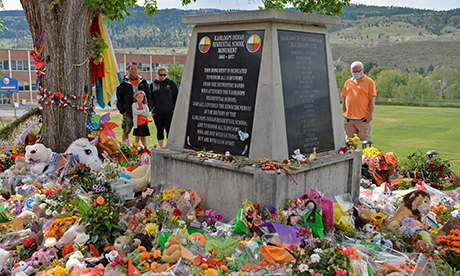Recent excavations at suspected mass grave sites of Indigenous children at Canadian residential schools have failed to uncover any human remains.
Some academics and politicians say this development has raised doubts about the veracity of claims surrounding these alleged graves.
Minegoziibe Anishinabe, also known as Pine Creek First Nation, conducted excavations at Our Lady of Seven Sorrows Catholic Church near the Pine Creek Residential School in Manitoba.
Ground-penetrating radar initially detected anomalies. However, no remains were found during the four-week dig.
Chief Derek Nepinak emphasised that this was an initial excavation, leaving room for future efforts.
Some critics have labelled these claims as unproven and cautioned against jumping to conclusions without concrete evidence.
They argue that more excavations are necessary to uncover the truth.
“I don’t like to use the word hoax because it’s too strong, but there are also too many falsehoods circulating about this issue with no evidence,” Jacques Rouillard, a professor emeritus in the Department of History at the Université de Montréal, told The New York Post on Wednesday.
“This has all been very dark for Canada. We need more excavations so we can know the truth,” Rouillard said.
“Too much was said and decided upon before there was any proof.”
Residential schools, operated by churches and the government, existed in Canada from the 1880s to the 20th century, with an estimated 150,000 children attending.
Critics argue that the residential school system forcibly separated children from their families and suppressed their Indigenous heritage.
While the harsh conditions at these schools have been acknowledged, scepticism persists regarding the claims of mass graves.
Pope Francis apology
Despite the controversy, the Canadian government allocated significant funds for research and child welfare claim settlements involving residential school attendees.
Pope Francis also issued a formal apology on behalf of the Catholic Church.
Several writers, academics and politicians have cautioned against accepting the narrative of mass graves without sufficient verifiable evidence. The critics have faced criticism themselves and have been labelled “genocide deniers.”
Eldon Yellowhorn, a professor and founding chair of the Indigenous Studies department at Simon Fraser University in British Columbia, told The New York Post in 2022 that he was cautious about the veracity of some of the more highly charged claims.
Yellowhorn, a member of the Blackfoot Nation, had been hired by Canada’s powerful Truth and Reconciliation Commission to search for and identify gravesites of Indigenous children at the residential schools.
But he said that many of the graves he found were from actual cemeteries, and it wasn’t clear how they had died.
Sources
Additional reading
News category: World.




